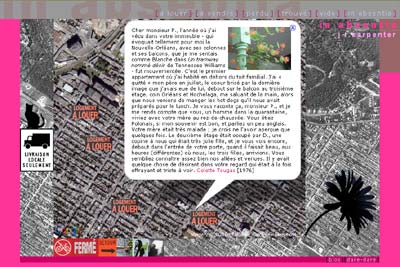
Interrupt is a festival celebrating writing and performance in digital media in Providence, Rhode Island, Friday October 17th – Sunday the 19th. Events are hosted by Brown University and Rhode Island School of Design. Participating artists will share work that in some way addresses the theme of the festival: Interrupt.
Why “Interrupt”? In computing, a hardware interrupt request or IRQ is used to prioritize the execution of certain processes over others. It is a command sent to the processor to get its attention, signaling the need to initiate a new operation. A series of IRQ roundtables will promote the maximum possible open discussion amongst all those attending. There will be a number of prominent, named critics, theorists, and artists who will have been asked to speak, but they will not give papers or even ‘panel-style’ presentations. Instead they will prepare an IRQ. I have been asked to speak. Being invited to interrupt is a rare opportunity. Here is my IRQ:
When I first heard the theme of the Interrupt festival I thought: Perfect! I’m a champion interrupter; everyone says so.
One of my earliest memories is of my mother telling me to stop interrupting. I remember standing next to her, waiting for it to be my turn to speak. There was never a break in the conversation. At first I thought this was because my mother was loquacious, from the Latin: loqu, to speak. But interlocution is speech between two or more persons, I reasoned. Surely, eventually, my turn would come.
An interlocutor is someone who takes part in a conversation. An interloper, in my experience, is someone who would like to take part in a conversation but who is unable to interpret the complex laws of interlocution.
Gradually I realized that my mother’s imperative that I stop interrupting arose from her disavowal of the interruption inherent in interlocution. The word “interlocution” is the past participle of interloqu.
inter + loqu = to interrupt + to speak.
My mother’s preferred modus loqui was the soliloquy.
solus + loqu = alone + to speak.
It was never going to be my turn to speak. So I learned to write instead.
My most recent electronic literature project, in absentia, hacks the Google Maps API to interrupt a sterile satellite view of my neighbourhood with short stories of displacement written from multiple points of view, by multiple authors, in multiple languages. In recent years many of my long-time, low-income neighbours have been forced out by gentrification. The neighbourhood is haunted now, with their stories. Our stories. Our building is for sale; we may be next. Faced with imminent eviction, and once again excluded from the official conversation, my only recourse is to interrupt. With silhouette voids, cryptic signage and quick glimpses. Some one has to say something. These small details of our daily lives are not visible from space and are all too soon to be erased.
Here is one excerpt from in absentia:
Our building is for sale. Our landlord has been making us crazy with renovations that we don’t want, superficial fixes that surely won’t fool anyone. Last weekend he decided he didn’t need to warn us in advance that he’d be replacing the front steps to our second-floor apartment because, technically, the repairs weren’t inside our apartment. Likewise, this week he didn’t warn us that he’d be painting the new steps, and the cast-iron fence out front, and all day we were trapped inside while the rust-proof-paint fumes wafted through our rooms. Yesterday morning he over-heard me calling him a fucking moron. I’m warning you, he shook his fist like a sitcom villain. This morning he affixed a NO BIKES sign to the freshly painted front fence in the exact same spot where I’ve been locking my bike for the past ten years. I guess he means business. I guess this means war.
J. R. Carpenter || in absentia

. . . . .